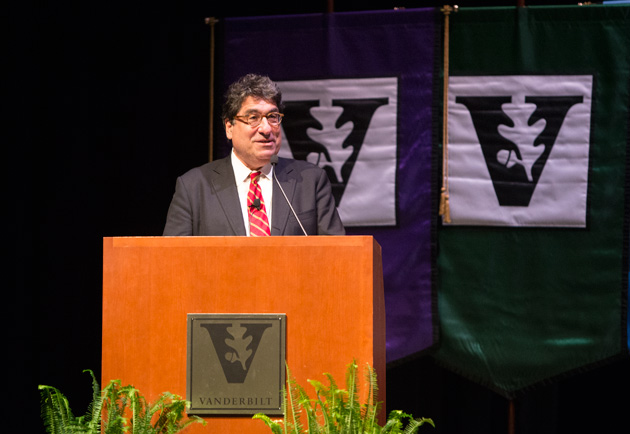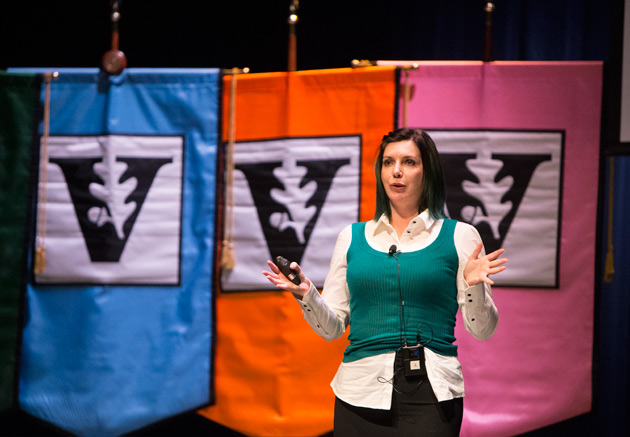
Chancellor Nicholas S. Zeppos extolled the important role of America’s research universities in fueling the nation’s future during the Spring Faculty Assembly on April 5.
Speaking in Langford Auditorium, the chancellor detailed Vanderbilt’s recent wins in the public arena to protect the university from fiscal and regulatory assaults on federal research funding, grant funding for indirect costs, and tax proposals that would have discouraged students from seeking graduate degrees.
“We fought and we won against draconian policies that attacked our very being and mission as a university,” he told the audience of faculty and administrators. “We fought and fight so hard because we believe—we know—that America’s universities are the best investment in our nation’s future and that American universities nurture and prepare the young citizens who nourish our democracy and change our world.”
He also noted that Vanderbilt banded together with universities across the country to fight the Trump administration’s travel ban, and that this coalition continues to fight for a solution for the young scholars and leaders affected by the decision to end DACA (Deferred Action for Childhood Arrivals).
During the presentation, Zeppos also announced a $20 million gift from Board of Trust Chairman Bruce Evans, BE’81, and his wife, Bridgitt, to help support university initiatives focused on the undergraduate living-learning experience, as well as leadership positions in the School of Engineering. The gift also includes an unrestricted bequest for future use.
Learn more about the Evanses’ generous gift. >>
In addition, Zeppos announced that the university will be providing seed funding for the new Center for Sports and Society, which was announced in January.
The assembly kicked off with a presentation titled “Music of the Spheres: The Spacetime Symphony of Gravitational Waves” by Kelly Holley-Bockelman, associate professor of astrophysics and director of the Fisk-Vanderbilt Masters-to-Ph.D. Bridge Program. Dr. Geoffrey Fleming, president of the Faculty Senate, gave an update on the senate’s activities. Zeppos then joined Fleming onstage to announce the winners of the spring faculty awards.
Learn more about the spring faculty award winners. >>
In his speech, Zeppos thanked the faculty for their dedication in pursing Vanderbilt’s common mission of positively impacting humankind. He reached back half a century to quote from John F. Kennedy’s final speech, delivered at Amherst University on Oct. 26, 1963, when the president reminded the audience of the obligations of America’s colleges and universities.
“What good is a private college or university unless it is serving a great national purpose?” Kennedy said. “In return for the great opportunity which society gives the graduates of this and related schools, it seems to me incumbent upon [them] to recognize their responsibility to the public interest.”
The chancellor responded to that challenge, saying, “Vanderbilt serves this national purpose: to do the things that others simply won’t; to educate students who can’t afford to pay; to conduct the basic research that is the foundation of tomorrow’s cures; to encourage critical dialogue that makes us uncomfortable; and to model civility during a time when bombast and cults of personality rule the day.”

Zeppos lauded the faculty for their accomplishments, saying, “The ability to positively impact humankind is our common mission as members of the Vanderbilt faculty. Together we are working every day to invest in human progress.”
He also noted that the university had extended its first offers to Russell G. Hamilton Scholars, and that the goal was to name at least 100 scholars starting this fall. The scholars program is part of the $300 million new endowment earmarked for graduate education and research.
In closing, Zeppos marked the 50th anniversary of the assassination of Dr. Martin Luther King Jr. by quoting from his writings, in which the civil rights leader said that every step forward in human progress required “tireless exertions and passionate concern of dedicated individuals.”
“We choose to do this work here, at Vanderbilt, because this is a place that knows there is power in proximity,” Zeppos said. “There is value in dialogue. There is opportunity in community. And we use this opportunity as an elite institution not for our own betterment, but for the betterment of others.”